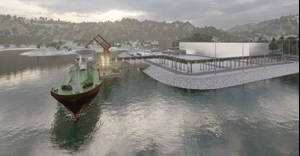Horisont Energi, Neptune Energy to develop CCS project in Norway
Horisont Energi and Neptune Energy today announced the signing of a Memorandum of Understanding (MoU) to develop the Errai Carbon Capture and Storage (CCS) project in Norway.
Errai could store 4-8 million tons of CO2 annually, with the potential to store more in later phases. The project includes an onshore terminal for intermediate CO2 storage, with the intention to permanently store the CO2 in an offshore reservoir.
The onshore terminal would be capable of receiving CO2 from European and domestic customers, including from the planned CO2 terminal at the Port of Rotterdam. Several onshore locations in Southern Norway are being evaluated for the terminal.
Neptune Energy brings subsurface expertise and extensive carbon capturing and storage experience to the project, having reinjected CO2 in the K12-B gas field in the Dutch North Sea for the last 14 years, as well as being a partner in the Norwegian Snøhvit field, which has been reinjecting CO2 since 2008.
Bjørgulf Haukelidsæter Eidesen, CEO of Horisont Energi, said: “We are delighted that Neptune Energy chose to work with us on this large-scale industrial CCS project. There is a growing demand for CO2 storage in the market. We believe that this project and our other CCS activities are essential for the net zero transition.”
Neptune Energy’s Managing Director for Norway and the UK, Odin Estensen, said: “Sharing the vision of carbon neutrality, Neptune is excited to partner up with Horisont Energi. We look forward to leveraging both our oil and gas operations capabilities as well as our significant experience of operating carbon capture and storage activities.
“Errai complements Neptune’s strategy to store more carbon than is emitted from our operations and from the use of our sold products by 2030.”
CCS developments are crucial for accelerating the transition to a lower carbon future, and the Errai project can play an important role in this phase.
The Errai project was initiated by Horisont Energi in 2021.



